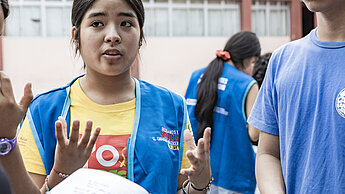"I could have been one of them"
Teenage pregnancy is another issue Natsumi often talks and hears about, because in the jungle region of Peru where she lives, the teen-pregnancy rate is among the highest in the country; one in five girls in Loreto is pregnant.
“People see children suffering, but few people do something about it,” she says. “I’m happy to be one of those people who want to generate a change. And it’s not just me. A lot of young people want to make a change in our society. We can all help someone else.”
Natsumi candidly admits that hearing about the problems teenagers in her community face shocks her. “I could have been one of them, but I had another kind of education,” she says. That education came, in part, from her participation in a programme where she learnt about her sexual and reproductive health and rights. She also developed the skills to converse candidly with her peers about contraception; safe, equal, caring and consensual relationships; and cultural expectations around masculinity. She also regularly advocates for teens with community leaders.
“When I talk with other teens, I hope they will share that information with even more teenagers,” she says.


